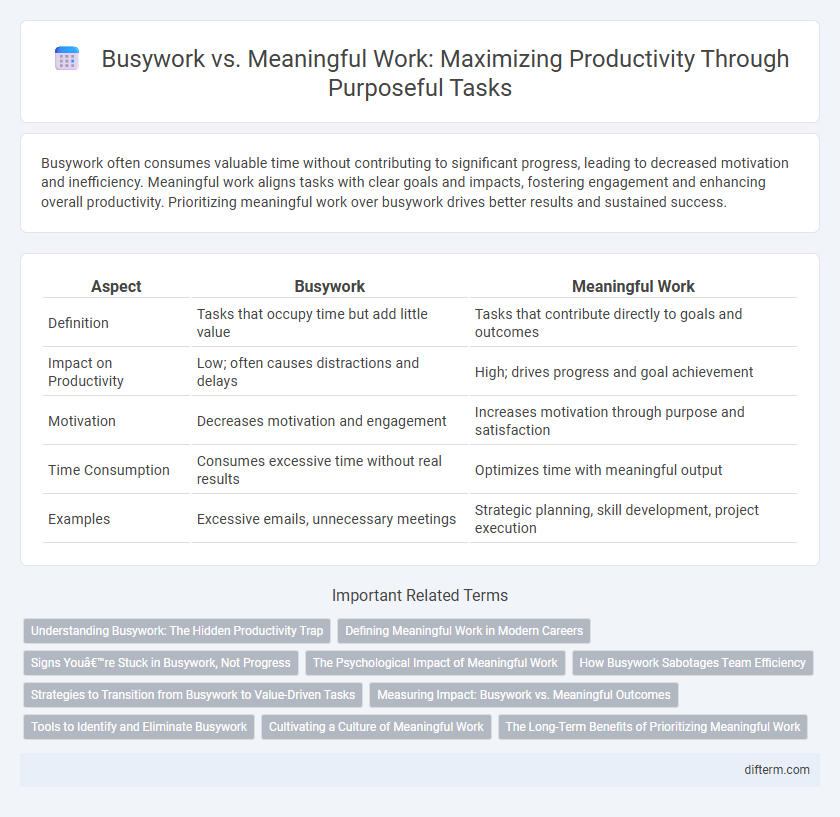Busywork often consumes valuable time without contributing to significant progress, leading to decreased motivation and inefficiency. Meaningful work aligns tasks with clear goals and impacts, fostering engagement and enhancing overall productivity. Prioritizing meaningful work over busywork drives better results and sustained success.
Table of Comparison
| Aspect | Busywork | Meaningful Work |
|---|---|---|
| Definition | Tasks that occupy time but add little value | Tasks that contribute directly to goals and outcomes |
| Impact on Productivity | Low; often causes distractions and delays | High; drives progress and goal achievement |
| Motivation | Decreases motivation and engagement | Increases motivation through purpose and satisfaction |
| Time Consumption | Consumes excessive time without real results | Optimizes time with meaningful output |
| Examples | Excessive emails, unnecessary meetings | Strategic planning, skill development, project execution |
Understanding Busywork: The Hidden Productivity Trap
Busywork consists of low-impact tasks that consume time without contributing significantly to long-term goals or value creation, often leading to wasted effort and reduced overall productivity. Identifying and minimizing busywork requires recognizing repetitive or non-essential activities that give the illusion of being productive but fail to move projects forward. Focusing on meaningful work, which aligns with strategic objectives and produces measurable outcomes, enhances efficiency and drives sustained progress.
Defining Meaningful Work in Modern Careers
Meaningful work in modern careers involves tasks that align with personal values, contribute to long-term goals, and create tangible impact beyond routine busywork. It emphasizes purpose-driven activities that foster skill development, creativity, and intrinsic motivation, resulting in higher job satisfaction and sustained productivity. Prioritizing meaningful work reduces burnout and enhances overall career fulfillment by focusing on outcomes that matter both professionally and personally.
Signs You’re Stuck in Busywork, Not Progress
Constantly replying to non-essential emails and attending unnecessary meetings are key signs you're stuck in busywork, not progress. Spending hours on tasks that don't directly contribute to your main goals often indicates a lack of meaningful work. Tracking output quality over activity quantity helps identify whether your efforts drive real productivity or merely create the appearance of busyness.
The Psychological Impact of Meaningful Work
Engaging in meaningful work significantly enhances psychological well-being by fostering a strong sense of purpose and fulfillment, which reduces stress and burnout. Unlike busywork, which often leads to feelings of frustration and disengagement, meaningful tasks increase motivation and overall job satisfaction. Research from organizational psychology highlights that employees involved in purposeful activities exhibit higher resilience and improved mental health outcomes.
How Busywork Sabotages Team Efficiency
Busywork diverts team members from high-impact tasks, reducing overall productivity and stalling project progress. It consumes valuable time without contributing to meaningful outcomes, causing frustration and diminished morale. Removing busywork enables teams to focus on strategic priorities, enhancing efficiency and driving measurable results.
Strategies to Transition from Busywork to Value-Driven Tasks
Prioritize tasks that align with your core goals by conducting a weekly audit to identify and eliminate busywork activities such as unnecessary meetings or redundant reporting. Implement the Eisenhower Matrix to categorize tasks based on urgency and importance, ensuring focus on high-impact, value-driven work. Leverage time-blocking techniques to allocate dedicated periods for deep work, minimizing distractions and enhancing productivity on meaningful projects.
Measuring Impact: Busywork vs. Meaningful Outcomes
Measuring impact in productivity requires distinguishing busywork from meaningful outcomes by evaluating tasks based on their contribution to strategic goals and tangible results. Busywork often involves repetitive, low-value activities that consume time without advancing key objectives, whereas meaningful work drives progress, innovation, and measurable improvements in performance. Clear metrics such as ROI, goal completion rates, and quality of output help quantify the value of work, ensuring efforts align with organizational priorities and maximize overall effectiveness.
Tools to Identify and Eliminate Busywork
Tools such as time-tracking apps and task management software help identify busywork by analyzing how time is allocated across tasks and highlighting low-impact activities. Automation platforms streamline repetitive processes, allowing employees to focus on meaningful work that drives strategic goals. Regular performance audits combined with productivity analytics enable continuous elimination of busywork, enhancing overall efficiency and job satisfaction.
Cultivating a Culture of Meaningful Work
Cultivating a culture of meaningful work involves prioritizing tasks that drive impact and align with organizational goals rather than engaging in busywork with little value. Encouraging employees to focus on purpose-driven projects enhances motivation, engagement, and overall productivity. Implementing clear objectives, regular feedback, and recognition systems helps eliminate busywork and fosters a workplace dedicated to meaningful contributions.
The Long-Term Benefits of Prioritizing Meaningful Work
Prioritizing meaningful work enhances long-term productivity by fostering skill development, deep focus, and sustained motivation, unlike busywork which offers only short-term task completion. Engaging in purposeful tasks promotes innovation and career growth, generating high-value outcomes that compound over time. Organizations investing in meaningful work experience improved employee retention and stronger competitive advantages in evolving markets.
Busywork vs Meaningful work Infographic

 difterm.com
difterm.com